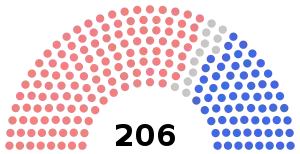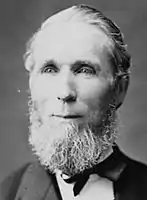1874 Canadian federal election
The 1874 Canadian federal election was held on January 22, 1874, to elect members of the House of Commons of Canada of the 3rd Parliament of Canada. Sir John A. Macdonald, who had recently been forced out of office as prime minister, and his Conservatives were defeated by the Liberal Party under their new leader Prime Minister Alexander Mackenzie.
| ||||||||||||||||||||||||||||||||||
206 seats in the House of Commons 104 seats needed for a majority | ||||||||||||||||||||||||||||||||||
|---|---|---|---|---|---|---|---|---|---|---|---|---|---|---|---|---|---|---|---|---|---|---|---|---|---|---|---|---|---|---|---|---|---|---|
| Turnout | 69.6%[1] ( | |||||||||||||||||||||||||||||||||
| ||||||||||||||||||||||||||||||||||
 1874 Canadian electoral map | ||||||||||||||||||||||||||||||||||
 The Canadian parliament after the 1874 election | ||||||||||||||||||||||||||||||||||
| ||||||||||||||||||||||||||||||||||
Macdonald's government had been forced to resign on November 5, 1873, because of allegations of corruption relating to the construction of the Canadian Pacific Railway (see the Pacific Scandal). The Liberals under Mackenzie formed a government two days later with an election called for January. The Tories were unable to recover from the scandal and lost the election as a result.
The election was the first general election after Prince Edward Island's entry into Confederation, and the first to use secret ballots in Canada.
National results

| 3rd Parliament | |||||||||
|---|---|---|---|---|---|---|---|---|---|
| Party | Party leader | # of candidates | Seats | Popular vote | |||||
| 1872 | Elected | Change | # | % | Change | ||||
| Liberal | Alexander Mackenzie | 140 | 95 | 129 | +35.8% | 128,455 | 39.49% | +4.77pp | |
| Conservative | John A. Macdonald | 65 | 63 | 39 | -38.1% | 57,691 | 17.74% | -8.02pp | |
| Liberal-Conservative1 | 38 | 36 | 26 | -27.8% | 40,234 | 12.37% | -0.53pp | ||
| Conservative Labour | 1 | 1 | - | -100% | 1,515 | 0.47% | +0.02pp | ||
| Independents | 7 | 1 | 4 | +300% | 10,453 | 3.21% | +1.58pp | ||
| Independent Liberal | 5 | 2 | 5 | +300% | 6,541 | 2.01% | +0.37pp | ||
| Independent Conservative | 3 | 2 | 3 | +50% | 2,360 | 0.73% | +0.03pp | ||
| Unknown | 104 | - | - | - | 78,008 | 23.98% | +1.78pp | ||
| Total | 355 | 200 | 206 | +3.0% | 325,247 | 100% | |||
| Source: Parliamentary website Archived 2015-09-24 at the Wayback Machine, Detailed riding results Archived 2015-09-24 at the Wayback Machine | |||||||||
Notes:
1 Liberal-Conservatives sat with the Conservative caucus in the House of Commons.
Acclamations
The following Members of Parliament were elected by acclamation;
- Ontario: 1 Liberal-Conservative, 13 Liberals
- Quebec: 10 Conservatives, 4 Liberal-Conservatives, 15 Liberals
- New Brunswick: 1 Conservative, 3 Liberals, 1 Independent Liberal
- Nova Scotia: 5 Liberals
- Prince Edward Island: 2 Liberals
Results by province
| Party name | BC | MB | ON | QC | NB | NS | PEI | Total | ||
|---|---|---|---|---|---|---|---|---|---|---|
| Liberal | Seats | 3 | 1 | 61 | 34 | 10 | 15 | 5 | 129 | |
| Popular vote | 34.1 | 47.0 | 39.6 | 34.8 | 47.1 | 38.1 | 56.8 | 39.5 | ||
| Conservative | Seats | 1 | 1 | 15 | 17 | 2 | 2 | 1 | 39 | |
| Vote | 4.5 | 13.8 | 19.5 | 17.6 | 6.8 | 17.8 | 17.5 | 17.7 | ||
| Liberal-Conservative | Seats | 1 | 10 | 12 | 1 | 2 | - | 26 | ||
| Vote | 16.9 | 10.4 | 14.9 | 8.6 | 19.2 | 15.4 | 12.4 | |||
| Conservative Labour | Seats | - | - | |||||||
| Vote | 0.9 | 0.5 | ||||||||
| Unknown | Seats | |||||||||
| Vote | 29.2 | 13.8 | 27.2 | 27.5 | 19.9 | 9.0 | 10.3 | 24.0 | ||
| Independent | Seats | 1 | - | - | 2 | 1 | 4 | |||
| Vote | 9.5 | 0.8 | 2.3 | 17.6 | 7.7 | 3.2 | ||||
| Independent Liberal | Seats | 1 | 2 | 1 | 1 | 5 | ||||
| Vote | 15.4 | 1.7 | 8.2 | 2.0 | ||||||
| Independent Conservative | Seats | 1 | 2 | 3 | ||||||
| Vote | 15.9 | 2.9 | 0.7 | |||||||
| Total seats | 6 | 4 | 88 | 65 | 16 | 21 | 6 | 206 | ||
References
- "Voter Turnout at Federal Elections and Referendums". Elections Canada. Retrieved March 10, 2019.

.jpg.webp)